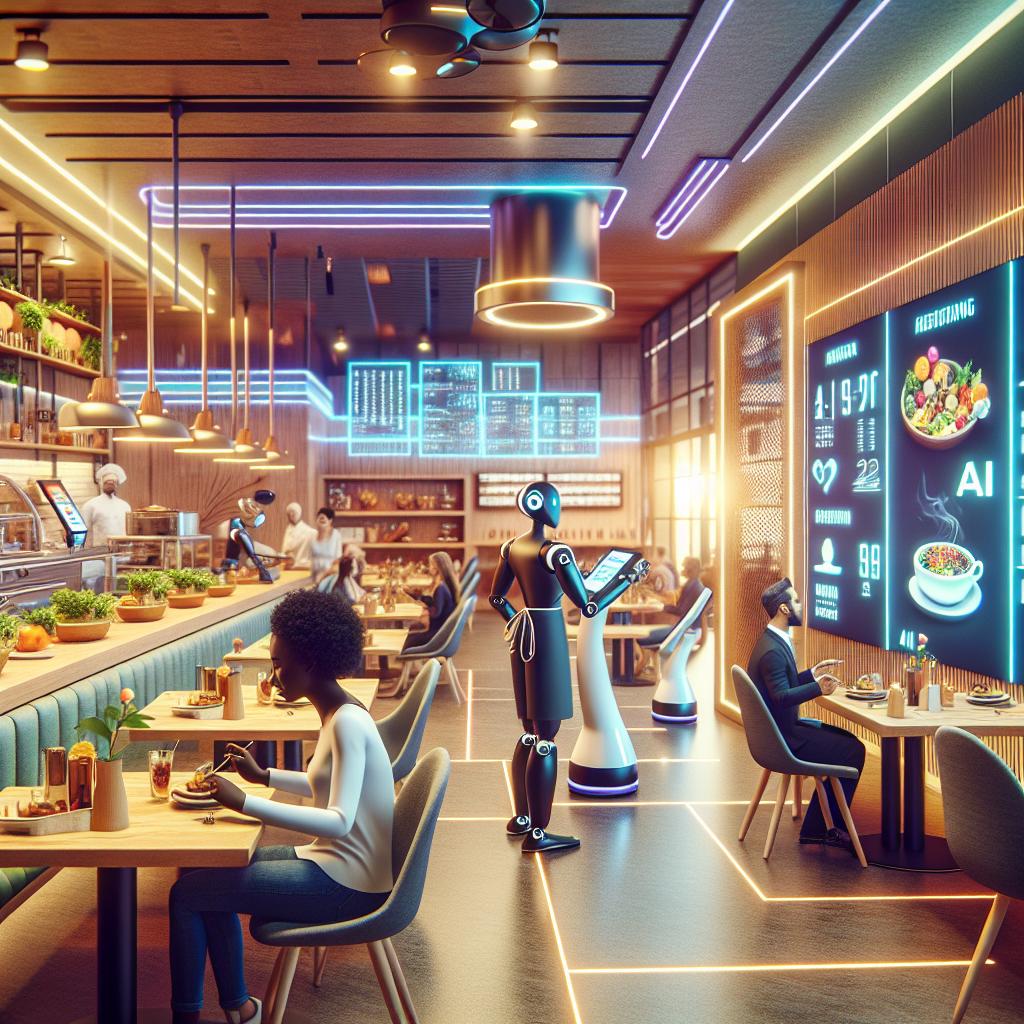TL;DR:
- Identifying market gaps and consumer preferences is crucial for developing a unique restaurant concept. Utilize AI tools to analyze data on current dining habits and unearth unique restaurant concepts.
- Creating a memorable dining experience involves designing with purpose, leveraging technology for enhanced service, cultivating a strong brand identity, and menu innovation.
- Crafting a solid business plan for a restaurant concept involves understanding financial projections, defining the restaurant's mission and vision, conducting market research, and developing a marketing strategy.
- Navigating legal and regulatory requirements for a small restaurant business idea includes obtaining necessary permits and licenses, complying with health and safety regulations, creating a safe food environment, leveraging technology for efficient operations, and building relationships with local authorities.
- Market research for restaurant success entails analyzing target market demographics and preferences, evaluating the competitive landscape, identifying unique flavors, menu development, location analysis, customer experience, and marketing mix.
Ever wondered why some restaurants thrive while others barely survive? Finding the right business idea for a restaurant can feel like searching for a needle in a culinary haystack. You're passionate about food and dream of crafting that unforgettable dining experience, but how do you stand out in the bustling food scene? In this blog post, we'll slice through the noise and serve you innovative insights to create a unique restaurant concept that resonates with patrons. From scoping out market gaps to seasoning your business plan with success strategies, we've cooked up a guide that's less about following recipes and more about writing your own. Ready to turn the tables on the ordinary? Let's dig in!
Developing a Unique Restaurant Concept
When it comes to the culinary world, the competition is as fierce as it gets. For aspiring restaurateurs, finding a business idea for restaurant that stands out from the crowd is essential. It's not just about serving food; it's about crafting an experience that will linger in the minds of your customers long after they've left your establishment.
Identifying Market Gaps and Consumer Preferences
Before you can create a memorable dining experience, you need to understand what's missing in the market. Is there a particular cuisine or concept that's underserved? What are foodies in your area clamoring for? Conducting thorough market research is crucial. You might want to explore our startup’s business idea center to spark some inspiration.
"Innovation in the restaurant industry doesn't just come from culinary excellence; it also emerges from understanding what diners truly crave."
Consider using AI tools designed to evaluate consumer trends and preferences. By analyzing data on current dining habits, you could unearth unique restaurant concepts that resonate with today's discerning clientele.
Creating a Memorable Dining Experience
Once you've pinpointed a niche, think beyond the menu. The ambiance of your restaurant, service quality, and even the story behind your brand play integral roles in creating an innovative restaurant idea.
Designing with Purpose
Your restaurant’s design should reflect its theme and appeal to its target audience. Are you going for upscale elegance or quirky and casual? Every element from furniture to lighting contributes to the overall vibe and should be chosen carefully.
Leveraging Technology for Enhanced Service
Incorporating technology can streamline operations and elevate customer service. From digital menus that allow for instant feedback to AI-driven personalization, tech can transform how guests interact with your eatery.
Cultivating a Strong Brand Identity
A strong brand tells a story that customers want to be part of. Whether it's sourcing ingredients from local farms or supporting community events, find ways to connect on a deeper level with your patrons.
Menu Innovation
Unusual ingredient pairings, dishes inspired by global flavors or plates designed for Instagram-worthy presentation can all make your menu stand out. Just ensure every item reflects the essence of your unique selling proposition (USP).
For those looking at funding options for their innovative ideas, consider exploring business idea loans which could provide the financial support needed to bring your vision to life.
The key takeaway here is not just having great food but offering something beyond what other restaurants provide—a holistic experience that tantalizes all senses and leaves an indelible mark on one's memory.
Take Away
- Identify gaps in the market by analyzing current trends and consumer desires.
- Utilize technology both in design and service delivery for an enhanced dining experience.
- Craft a strong brand identity through storytelling and community engagement efforts.
Crafting a Solid Business Plan for Your Restaurant Concept
Embarking on the restaurant journey begins with a sizzling idea, but to turn that concept into a mouth-watering reality, you need more than just an enticing menu. A well-structured business plan is your recipe for success. So, let's slice through the process and discover how to create a business idea for restaurant that can satisfy even the most discerning investor's appetite.
Understanding Financial Projections and Budgeting
Before you start dreaming about the aroma of fresh ingredients wafting through your dining room, it’s crucial to get down to brass tacks with financial projections and budgeting. This isn't just about crunching numbers; it's about forecasting your future in the competitive culinary world.
Start by assessing your initial capital requirements – think of it as calculating how much dough you'll need before you can start baking. Next, project your revenue streams; will you be cashing in on breakfast crowds, or is your concept more of a fine-dining evening affair? Don't forget to factor in seasonality; after all, ice cream sales might dip when the temperature does.
"A successful restaurant thrives not just on good food but also on good numbers."
But where do you begin? Start by visiting CheckMyIdea-IA's Business Idea Center which offers resources and tools tailored for startups like yours. With their guidance, those intimidating spreadsheets will start looking like a friendly sous-chef ready to assist.
Defining the Restaurant's Mission and Vision
Your mission statement is more than just words on paper; it’s the heart of your business idea for restaurant. It defines why your establishment needs to exist beyond making profits. Are you aiming to revolutionize fast food with healthy options? Or perhaps bringing authentic foreign cuisine to an area starving for diversity?
A clear vision will guide every decision – from design and decor to hiring staff who share your ethos. It's what sets apart a fleeting eatery from one that becomes part of the community fabric.
Creating this core identity doesn't have to be daunting. For inspiration, check out AI Transformations in Business Ideas, which showcases how AI is reshaping industries with innovative concepts.
Now that we've whetted your appetite for planning success let’s dive deeper into each course of action.
Course 1: The Appetizer – Market Research
Just as no chef would dare serve a dish without tasting it first, no restaurateur should launch without thorough market research. Identify your target customers—are they busy professionals looking for quick lunch options or couples seeking intimate dining experiences?
Use resources such as Evaluating Business Ideas: The Key to understand market demands and tailor your offerings accordingly.
Course 2: The Main Dish – Crafting Your Unique Selling Proposition (USP)
What makes your restaurant stand out in a sea of eateries? Perhaps it’s an exclusive ingredient sourced directly from Italy or a cooking method passed down through generations—this is your USP.
Incorporate strategies highlighted in AI Startup Idea Revolutionize Industries to leverage technology in creating unique customer experiences or optimizing kitchen efficiency.
Course 3: The Side Dish – Location Analysis
The location can make or break a restaurant. You want foot traffic but not too much competition next door. Analyze demographics, accessibility, visibility, and parking availability.
For insights into choosing strategic locations using data analytics, explore AI Empowering Business Analysts.
Course 4: The Dessert – Marketing Strategy
No meal is complete without dessert; similarly, no business plan is finished without a marketing strategy. How will people learn about your restaurant? Social media campaigns featuring drool-worthy images could be key—or maybe local partnerships will spread the word effectively.
Learn from successful campaigns at Exploring Opportunities in AI Business Ideas where AI-driven marketing tactics are taking businesses to new heights.
Take Away
Crafting an irresistible business idea for restaurant starts with solid financial groundwork.
Your mission statement isn't fluff—it anchors every choice and creates brand loyalty.
Stand out with a strong USP by infusing technology into traditional dining experiences.
Remember these steps as you embark on creating not just another place to eat but a destination where memories are made over meals that delight both palate and soul.
Navigating Legal and Regulatory Requirements for Your Small Restaurant Business Idea
Starting a small restaurant can be a thrilling venture, especially when you have a business idea for a restaurant that's not just unique but also profitable. However, before the aroma of your delicious dishes wafts through the air, you must tackle the less savory part of the business: legal and regulatory requirements.
Obtaining Necessary Permits and Licenses
Before anything else, securing the right permits and licenses is crucial. This process will vary depending on your location, but generally, you’ll need a business license, food handler's permit, health department permit, signage permit, and possibly liquor licensing if you plan to serve alcohol.
"The bitterness of poor quality remains long after the sweetness of low price is forgotten."
This quote reminds us that cutting corners in obtaining permits might save money upfront but can lead to costly issues later. To ensure your small restaurant business ideas don't go south before they even start, invest time in researching what's required in your area. Check with local government websites or consult with an attorney specializing in foodservice laws to get accurate information.
Complying with Health and Safety Regulations
Health and safety regulations are non-negotiables in the restaurant industry. Adhering to these rules ensures that your establishment is not only legal but also safe for both employees and customers. Regular inspections will be part of your routine to maintain compliance with health codes.
A few things inspectors look at include:
- Proper food storage temperatures
- Cleanliness of facilities
- Adequate hand washing stations
- Pest control measures
While it might seem daunting at first glance, staying on top of these regulations is manageable with proper planning and organization. Developing checklists for daily operations can help maintain standards consistently.
Creating a Safe Food Environment
Creating a safe environment goes beyond passing health inspections; it involves fostering a culture where safety is paramount. Training staff on proper food handling techniques, cross-contamination prevention, allergy awareness, and emergency procedures lays a foundation for operational excellence.
Consider implementing technology solutions like digital temperature logs or inventory management systems that alert you when products are nearing their expiration date. Embracing such innovations aligns well with profitable restaurant ideas where efficiency meets compliance.
The Role of AI in Compliance
AI technology has become an ally in managing legalities efficiently. Systems equipped with AI can help track regulatory changes real-time or predict potential areas of concern before they become issues (exploring opportunities in AI business ideas). This proactive approach not only keeps your business compliant but also saves time and resources that could be better spent on enhancing customer experiences.
Building Relationships with Local Authorities
Fostering good relationships with local authorities who handle permits and inspections can provide immense value. They’re often willing to offer guidance during the setup phase and ongoing operations if they see genuine efforts toward compliance from businesses.
Leveraging Technology for Efficient Operations
In today’s digital age, leveraging technology can streamline complex processes involved in running a restaurant. From scheduling employee shifts around peak hours to managing inventory more effectively—there are numerous ways tech can bolster efficiency within your establishment (2024 MVP workspace trends to watch).
Technology also plays into marketing strategies that drive traffic to new restaurants. Social media platforms offer powerful tools for engagement while data analytics provide insights into consumer behavior which can inform menu development or promotional offers (analyzing business ideas for 2024 trends).
Final Thoughts on Compliance as an Opportunity
While dealing with legalities may initially seem burdensome when all you want is to cook up stormy flavors—it’s worth remembering that this groundwork forms part of creating sustainable businesses practices which ultimately contribute towards success stories among profitable restaurant ideas.
Take Away
- Always secure necessary permits before opening doors; research local requirements thoroughly.
- Implement regular training programs focused on health & safety standards.
- Explore AI-driven solutions & technologies to enhance compliance & operational efficiency.
Market Research for Restaurant Success
When you're cooking up a business idea for a restaurant, it's not just about the sizzle; the steak has to be just as good. And by steak, I mean solid market research that helps your restaurant concept stand out in a crowded marketplace. Let’s face it, we all love a good meal, but when it comes to turning that love into profit, you need more than just grandma’s secret recipe.
Analyzing Target Market Demographics and Preferences
Imagine opening a hip vegan bistro in a town where barbecue reigns supreme – might not be the best strategy, right? That's why understanding who you're serving is as crucial as what you're serving. So before you start dreaming of décor and signature dishes, take a deep dive into the demographics of your target area.
Are there enough avocado aficionados around to support your plant-based paradise? Or are you surrounded by carnivores craving their next meaty feast? Use AI tools to sift through data like age groups, income levels, and culinary trends. This way, you can tailor your menu and marketing to hit the sweet spot of customer demand.
Evaluating the Competitive Landscape
Next up on the menu: scoping out the competition. You wouldn't enter a chili cook-off without knowing what flavors have won in the past, would you? The same goes for launching your restaurant – know thy enemy (but keep it friendly). Check out nearby eateries to see what they’re dishing out. Are they killing it with Korean tacos or making waves with molecular gastronomy?
Take notes on everything from their pricing and presentation to their customer service style. And don't forget online reviews – they’re like secret diner reports at your fingertips! By understanding what works (and what doesn’t) for others, you can position your restaurant theme as unique yet appealing.
"In business, what's dangerous is not to evolve."
Remember that quote when planning your restaurant's concept because staying static in today’s fast-paced food scene could lead to an empty dining room.
Now let's spice things up with some practical steps:
-
Identify Your Unique Flavor: What will make your restaurant different? Will it be an immersive experience with themed dining rooms or perhaps an open kitchen where diners can watch their meals being prepared?
-
Menu Development: Designing a menu isn't just about picking dishes; it’s about creating an experience. Consider using AI technology from sources like AI-generated business plans to analyze consumer preferences and predict food trends.
-
Location Matters: It's like real estate – location, location, location! A great spot can draw crowds while poor visibility or accessibility can doom even the most delicious eateries.
-
Customer Experience: From ambiance to service quality, every interaction counts. Utilize feedback tools like instant evaluate solutions to continuously improve upon these areas.
-
Marketing Mix: Leverage social media platforms and local influencers to build hype before you even open doors! Get creative with promotions that’ll get people talking about your brand-new hotspot.
Take Away
- Tailor your restaurant concept based on thorough demographic analysis using AI insights.
- Differentiate from competitors by offering unique dining experiences or untapped cuisine.
- Continuously adapt by leveraging feedback and trend predictions through AI tools.
With these ingredients in hand – passion for food, comprehensive market research using cutting-edge AI analysis tools – your business idea for a restaurant is ready for success! 🍽🚀
Strategies for Ensuring Restaurant Success
When it comes to crafting a business idea for restaurant, it's not just about the sizzle of the grill or the artistry on the plate. In this digital age, where artificial intelligence (AI) is revolutionizing industries, how can you ensure your restaurant not only survives but thrives? Let’s sink our teeth into some juicy strategies that could make your restaurant concept the talk of the town.
Implementing Effective Marketing and Promotional Tactics
Nowadays, word-of-mouth has transformed into 'word-of-click'. It's all about online presence. Having a solid marketing strategy can be as crucial as perfecting your grandma’s secret recipe. Consider using social media to create mouth-watering campaigns that showcase your culinary creations. Leverage AI-powered analytics tools to understand customer preferences and tailor your promotions accordingly.
"In marketing, content is king, but engagement is queen and she rules the house."
By engaging with your customers online, responding to reviews, and sharing behind-the-scenes peeks into your kitchen operations, you build a community around your brand. And don’t forget email marketing – sending out newsletters with special offers can keep patrons coming back for seconds…and thirds!
Adapting to Evolving Consumer Trends and Preferences
The modern diner craves experiences as much as flavors. They are more health-conscious, environmentally aware, and open to exploring different cuisines than ever before. Staying ahead means tuning into these evolving trends.
Consider incorporating locally sourced ingredients to appeal to those seeking fresh and sustainable dining options. Embrace technology in the form of an AI business plan generator to streamline operations or introduce an app for easy reservations and ordering.
Moreover, with plant-based diets on the rise, offering vegan or vegetarian dishes could attract a broader customer base. Keep experimenting with new recipes – maybe AI can help here too by analyzing trending flavors across different regions!
Leveraging AI for Personalized Customer Experiences
Imagine if you could predict what dish a customer might order before they even know themselves! AI can analyze past dining habits providing insights that enable personalized recommendations – just like Netflix does with movies! This level of personalization can turn a first-time visitor into a loyal patron.
Additionally, chatbots on your website or social media platforms can provide instant assistance—be it answering queries about dietary restrictions or taking reservations—improving overall customer service.
Streamlining Operations with Smart Technology
Efficiency in restaurant operations is non-negotiable. From inventory management to table turnover rates, every aspect needs to run like clockwork. Here’s where AI steps in; smart systems help manage stock levels reducing waste and ensuring you’re never out of that key ingredient during rush hour.
Plus, integrating an AI-driven POS system can speed up transactions while gathering valuable data on purchasing behaviors – helping you make informed decisions about menu changes or pricing strategies.
Take Away
- Embrace digital marketing strategies and engage actively with customers online for increased visibility.
- Stay agile by adapting menus based on consumer trends; consider sustainability and health-centric options.
- Integrate AI technology for personalized experiences and streamlined operations that boost efficiency and profitability.
Conclusion
Frequently Asked Questions
What are some popular business ideas for a restaurant?
Some popular business ideas for a restaurant include starting a niche restaurant focusing on a specific cuisine, opening a fast-casual dining establishment, launching a food truck or pop-up concept, or creating a unique dining experience such as a themed restaurant.
How can I develop a unique business idea for a restaurant?
To develop a unique business idea for a restaurant, consider factors such as the target market, location, menu concept, and overall dining experience. Conduct thorough market research to identify gaps in the market and consumer preferences to help shape your unique business idea.
What are some key considerations when planning a business idea for a restaurant?
Key considerations when planning a business idea for a restaurant include conducting a feasibility study, creating a solid business plan, understanding local regulations and licensing requirements, identifying suppliers and vendors, and developing a marketing strategy to attract customers.
Is it important to conduct market research for my restaurant business idea?
Yes, conducting market research is crucial for understanding consumer preferences, identifying competition, and determining the demand for your restaurant concept. Market research helps in shaping your business idea and making informed decisions about the target market and positioning.
How can I ensure the success of my restaurant business idea?
To ensure the success of your restaurant business idea, focus on providing high-quality food and service, create a unique selling proposition that sets your restaurant apart, implement effective marketing strategies, maintain strong financial management, and adapt to changing consumer trends and preferences.





Leave a Reply